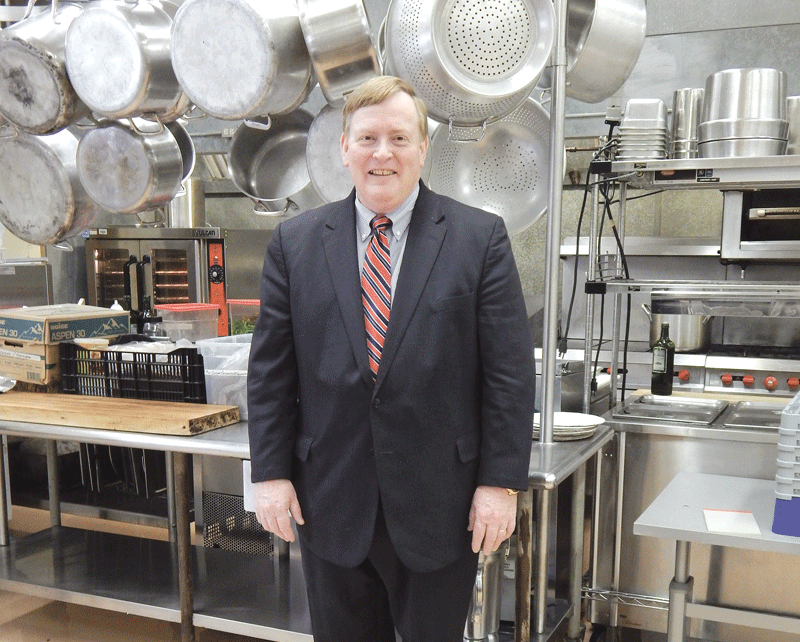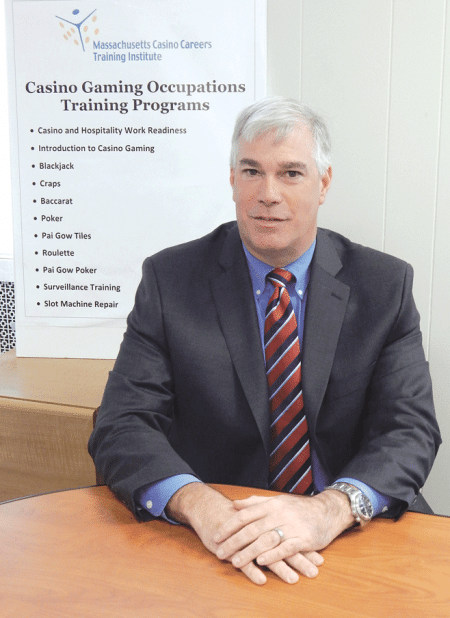HCC, STCC Begin Training Programs for Casino Careers
A Winning Hand

Jeffrey Hayden says HCC has expanded its hospitality and culinary programs to provide a needed pipeline of skilled workers to fill emerging jobs in Western Mass.
Robert LePage has lost track of how many times someone has told him, ‘I want to become a dealer.’
The pronouncements began long before MGM and Springfield were selected as the casino developer and city of choice in Western Mass., and LePage, executive director of Training and Workforce Options (TWO) at Springfield Technical Community College (STCC), said they increase by the day.
His observation constitutes a reality check, because he knows that most people aren’t aware of what the job entails.
“I ask whether they like doing basic math, if they enjoy interacting with people all day, if it would bother them to stand on their feet for seven hours at a time, and if they realize they will have to work nights, weekends, and holidays because these are the busiest times in a casino,” said LePage.
STCC and Holyoke Community College (HCC) have formed a collaboration to provide knowledge about jobs, training, and qualifications that will be required by MGM Springfield when it begins hiring, and have joined forces with numerous local organizations that have a vested interest in filling the gap for the estimated 3,000 employees the casino will need.
Efforts began with TWO program, which was established by the presidents of the two community colleges with the goal of supporting regional workforce needs. Since its inception, a seemingly endless amount of work has been done to create custom-designed programs and provide employee assessments, skills training, and professional development, while strategically recruiting students for credit and non-credit programs.
“We have worked on joint projects in the industrial sector, manufacturing, IT, and hospitality, along with basic workforce literacy,” LePage explained.
Two years ago, TWO conducted a study with the largest hospitality/culinary employers in the area, including Sheraton as well Sodexho and Aramark, which provide food-service operations for local hospitals, schools, and colleges.
The study uncovered a significant finding: although the casino will need about 1,000 people to fill jobs in this sector, there is already a dearth of qualified individuals to meet the needs of local employers in the Pioneer Valley, where about 400 new positions open each year.
“We suspected this in the past and had talked about the need to expand our programs, but with the advent of the casino, the timing was finally right,” said Jeffrey Hayden, vice president of Business and Community Services for Holyoke Community College, adding that the hospitality/culinary field is one of the largest entry-level job markets in Western Mass. “MGM adds to the need, but it is the industry itself that is driving our new offerings.”
In the past two years, HCC has established a large number of new non-credit and credit courses in that field of study. In addition, as an offshoot of TWO, the colleges have taken the lead in establishing the Massachusetts Casino Training Institute, which will offer a gaming school in Springfield as well as hospitality and culinary training in Holyoke.
A tremendous amount of collaboration has taken place to get this off the ground between the colleges, the Greater Springfield Convention & Visitors Bureau, the Regional Employment Board of Hampden County, the area’s one-stop career centers, and local nonprofits and businesses whose clientele or employees could benefit from earning a certificate or advancing their hospitality/culinary and customer-service skill sets.
“We have also worked with our sister community colleges in the East and Southeast, and are trying to create a casino-training model that will be replicated across the state,” LePage said. “We have done a lot to figure out how to build this system. People have no idea how complex it is, but this gaming scale-up is the largest that has been done in decades. When MGM Springfield opens, it will be among the top five employers in Western Mass.”
Chipping In
STCC and HCC are working closely with MGM and the Mass. Gaming Commission to create the curriculum for a certificate program in gaming-related occupations, and a workforce plan that has taken several years to complete will be submitted to the commission within the next three to six months.
“Our goal is to assist in providing a labor pool and ensure the availability of training programs that will provide general instruction for careers, and specific training for licensed occupations such as table dealers, slot attendants, slot-repair technicians, and surveillance,” LePage explained.
Informational sessions are expected to begin as early as this summer, which will allow interested people to gain critically important information about gaming jobs and what is required to work at them. The sessions will include talks by employees from operating casinos, who will likely share the pros and cons of their positions to ensure prospective candidates know what to expect.
LePage said an announcement is expected next month that will let people know where the school will be located in Springfield.
“The courses held there will run about 20 hours a week and for six to 14 weeks, and will include basic competency skills, as well as technical training. There will also be simulated hands-on training stations where students will learn to deal cards as well as how to deal with customers,” he told BusinessWest, adding that the colleges are working with the state to provide free tuition to qualified applicants.

Robert LePage says a center will open in Springfield to teach people the skills they need for gaming-related occupations.
However, these sessions will not begin until about 90 days before MGM begins hiring to prevent a gap between learning and putting newly acquired skills to work.
Although these courses of study are still in the definitive stages, HCC has already begun to fill the existing gap of qualified employees in the hospitality/culinary industry that will grow when MGM begins hiring.
Hayden said the need is so great that HCC has been able to place close to 80% of its hospitality/culinary graduates into jobs, while incumbent workers who enrich their education have attained an 85% increase in pay, position, or responsibility.
“This is one of the largest occupational sectors in the Pioneer Valley,” he noted. “It employs about 30,000 people, so our goal is to provide basic training so people can get a job, get a better job, or be able to do their job better.”
New non-credit courses for restaurant, food-service, and hotel workers include “ServSafe Food Safety,” “Customer Service and Workplace Communication,” “Management and Leadership,” “Goal Setting and Productivity,” and a number of other professional-development offerings. There are also one-year certificate programs and associate-degree programs in hospitality and food-service management.
“We have the only post-secondary program for this field of study in the region,” Hayden said.
HCC plans to open a new Center for Hospitality and Culinary Excellence in January 2017 that will offer workforce and credit programs.
“It’s a highly anticipated investment by the college, the state, and the federal government because we recognize the need extends across the marketplace in Hampden County and the Pioneer Valley,” Hayden explained. “The new, 20,000-square-foot facility will have state-of-the-art hot and cold labs, a bakery, a dining area, a demonstration area, and a mock hotel room where people can learn skills like how to make a bed.”
Training is also ongoing in Springfield and Northampton, and may begin in Ware to accommodate people with transportation issues. In addition, two 14-week training sessions have been offered at Dean Technical High School in Holyoke in collaboration with the Hampden County Sheriff’s Office.
“It’s part of the sheriff’s effort to have people leave with workplace skills,” Hayden said, adding that, although former inmates might not be able to work in the casino, they can enter many of the positions available in the area.
A significant amount of effort has also been expended to help people pay for their education. Over the last three years, HCC has received Rapid Response grants from the Department of Higher Education totaling $182,000 that have allowed more than 250 people to earn more than 300 certificates in these fields, and the college recently applied for a Workforce Competitiveness Trust Fund grant to provide more scholarships.
“There are more than 400 new job openings in the Pioneer Valley every year, and employers are looking for people who have some kind of training or experience,” Hayden said, noting that one local employer recently pledged to hire people who completed a ServSafe Food Safety course.
The Stakes Are High
STCC kicked off a new, 14-week advanced customer-service credit program last October to help build a stronger pipeline of employees.
“The casino will present a significant opportunity in terms of jobs, and a good body of work has already been done, which is important because, to capitalize on these opportunities, we have to get people prepared to move in and up in the workforce,” LePage explained. “It’s a pretty large project, and shovels are growing in the ground.”
Which means the time is right for people to begin researching gaming occupations or take part in hospitality/culinary training if they hope to embark on an entry-level casino career, change careers, or advance in their own workplace.





